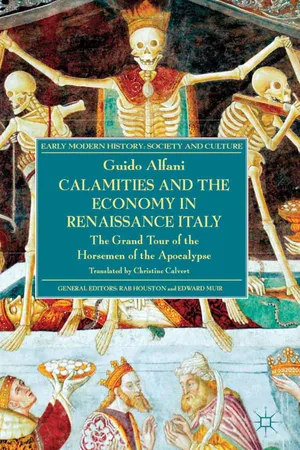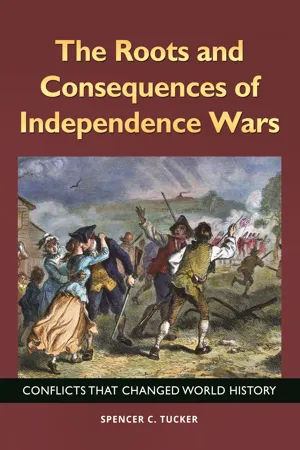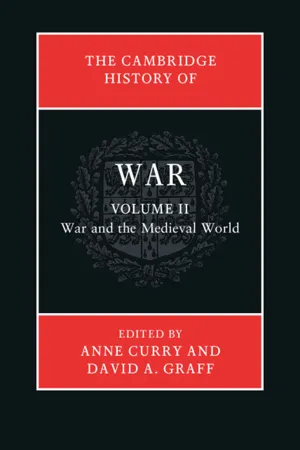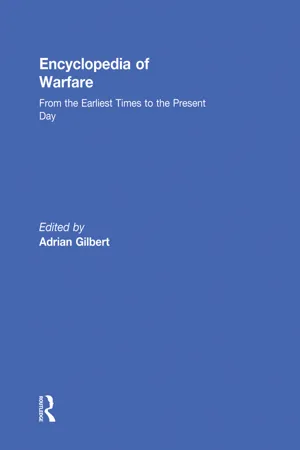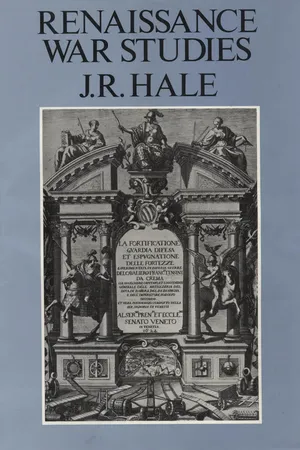History
Italian Wars
The Italian Wars were a series of conflicts fought between major European powers for control over the Italian peninsula from the late 15th to the mid-16th century. These wars involved shifting alliances and marked the transition from medieval warfare to the early modern period. The conflicts had a significant impact on the political, cultural, and military landscape of Europe.
Written by Perlego with AI-assistance
Related key terms
1 of 5
5 Key excerpts on "Italian Wars"
- eBook - ePub
Calamities and the Economy in Renaissance Italy
The Grand Tour of the Horsemen of the Apocalypse
- G. Alfani(Author)
- 2013(Publication Date)
- Palgrave Macmillan(Publisher)
This European involvement prevented any easy or quick solution to the Italian dynastic and diplomatic problems and resulted in an unusually intricate and harsh series of wars, which are impossible here to trace in detail. Only the first campaign (Charles VIII’s) has been reconstructed with some precision to provide contextualization and as an example of the complexity of both the military events of the period and of the Italian diplomatic affairs. The developments of the rest of the Italian Wars will now be described only briefly, although specific episodes will be detailed in the following sections when they are relevant to the analysis of the economic, social and demographic consequences of war. In particular, it is important to distinguish the six phases into which the wars of 1494–1529 can be divided, marked by a continual shift in alliances: 6 1 1494–95 : Charles VIII’s campaign, as detailed above. 2 1499–1504 : The French return to Italy to conquer the Duchy of Milan, over which the new king Louis XII has dynastic claims. 7 Between 1499 and 1500, the duchy changes hands on various occasions, despite the help given to Ludovico il Moro by Emperor Maximilian. The French and Spanish agree to divide between them the Kingdom of Naples, which is obliged to surrender (1501), and war breaks out between the two victorious nations over the division of the territory (1502–04). The Spanish prevail and gain control of the whole of southern Italy - eBook - ePub
The Roots and Consequences of Independence Wars
Conflicts That Changed World History
- Spencer C. Tucker(Author)
- 2018(Publication Date)
- ABC-CLIO(Publisher)
Italian Wars of Independence (Wars of Italian Unification) (1848–1849, 1859, and 1866) CausesThe Wars of Italian Independence, also known as the Wars of Italian Unification, are usually identified as occurring in 1848–1849, 1859, and 1866. When the wars of the French Revolution and the Napoleonic era began in 1792, Italy was little more than a geographical expression—a patchwork of 15 small states, each in rivalry with, if not openly hostile to, the others. Not since the days of the Roman Empire had the Italian Peninsula been united politically.The wars of the period 1792–1815 had a profound impact on Italy, however. The French Army of Italy commanded by Napoleon Bonaparte had conquered much of the peninsula and introduced a uniform system of laws and administration. Napoleon had also reduced the number of states to three. Part of northwestern and east-central Italy was incorporated into France, and there was the Kingdom of Italy in the northeast and the Kingdom of Naples in southern Italy. Napoleon, the great practitioner of French nationalism, had also declared at St. Helena that “Italy is one nation.”The example of what the French had accomplished with a more effectively administered nationalist state was not lost on the Italians. The Congress of Vienna of 1814–1815, which met to redraw the map of Europe after the defeat of Napoleon, had resurrected the old Italy of many different monarchial states dominated in the north by Austria. Small nationalist uprisings in the immediate aftermath of the Napoleonic Wars by the so-called Carbonari had been easily crushed. Nonetheless, the peninsula was swept by a new spirit, what came to be called the Risorgimento (Resurgence).Three men played key roles in the unification of Italy to follow. They were Giuseppe Mazzini (1805–1872), Count Camillo Benso di Cavour (1810–1861), and Giuseppe Garibaldi (1807–1882). English poet George Meredith wrote of them “Cavour, Mazzini, Garibaldi: Three: Her Brain, her Soul, her Sword.” - David A. Graff, Anne Curry(Authors)
- 2020(Publication Date)
- Cambridge University Press(Publisher)
32 Few dispute French and northern European expertise and innovation with regard to the weapon. But Italianists now stress local familiarity with the cannon and question the role the weapon played in French success in the peninsula. They argue that the French 31 Hall, Weapons and Warfare, pp. 67–105. 32 Francesco Guicciardini, The History of Italy, trans. Sidney Alexander (Princeton, Princeton University Press, 1984), pp. 50–1. william caferro 406 invading army was in fact not substantially different from forces already operating in Italy. Its advance was in the first instance facilitated by a breakdown in Italian political alliances. The city of Florence has absorbed much of the blame for failing to adequately block its passes through the Apennine mountains, thus allowing French forces to move largely unim- peded to Naples. War and society The overall impact of war on Italian society is the focal point of much current research. The most obvious effect of war during the period was political. The years 1300 to 1500 coincided with the consolidation of political power on the peninsula, with the formation of territorial states and the so-called five Renaissance states (Venice, Naples, Milan, Florence, and the papacy). It is unclear, however, whether war served as a mainspring or makeweight for these developments. Consolidation and territorial expansion involved a complex game of diplomacy and maneuver in which the acquisition of land often preceded wars (purchased with money) and was as much a cause of them as their result. The notion that war made more efficient or “mod- ernized” government bureaucracies, an argument stated most forcefully in the sociological work of Charles Tilly, is uneasily applied to Italy. 33 The Venetians and Milanese undertook important bureaucratic changes, but it would be an overstatement to assert that their administrations became efficient or modern as a result of warfare.- eBook - ePub
Encyclopedia of Warfare
From the Earliest Times to the Present Day
- Adrian Gilbert(Author)
- 2013(Publication Date)
- Routledge(Publisher)
The Wars between France and Spain in ItalyThe Battle of Lützen, November 16, 1632, was a victory for the Swedes over the Imperial Army. Triumph was bought at a heavy cost, however, as the Swedish king, Gustavus Adolphus, was killed, along with 12,000 Imperialists and 10,000 Swedes.In 1494 Charles VIII of France invaded Italy. His army was probably the finest and most professional in the world at that date. Gone were the days of mass feudal levies; instead, the French monarch marched with well-trained crossbowmen and professional Swiss mercenaries. But his well-served bronze cannon signaled the real change that warfare was undergoing at the end of the 15th century.T he first signs of the military revolution occurred in Italy, as part of a dynastic struggle for Italian territory and influence between France and Spain. At the end of the 15th century Italy was the richest region of Europe, its prosperity derived through agriculture, manufacture, finance, and trade. But Italy did not owe its wealth to political unity, being divided into many states usually ruled over by the government of a single city. Some of these states, like Milan or Naples, were large and relatively powerful. Others, like Venice and Florence, were merely rich.Many of the Italian states, both large and small, sought the support of more powerful kingdoms outside Italy for help against their neighbors. And the prospect of rich economic reward only encouraged these kingdoms to interfere in Italian political affairs.King Charles VIII of France (1470–98) claimed the throne of Naples, through a distant family connection, and in 1494 prepared to invade Italy to secure the Neapolitan kingdom. Leading an army of 25,000 men, including 8,000 Swiss mercenaries, Charles marched down through the “boot” of Italy and captured Naples. His force included large numbers of French crossbowmen, and its bronze cannon were mounted on wheeled carriages to give them sufficient speed to keep up with the army’s march, and they were served by well-trained crews. - eBook - PDF
- J. R. Hale(Author)
- 1983(Publication Date)
- Hambledon Continuum(Publisher)
Before showing, however, that the horror which followed 1494 —or, more properly, Fornovo, in 1495, the first full battle of the Italian Wars—was due to a revelation of the poor state of Italian morale, it must be stressed, and in some detail, that this horror was not a reaction against war as such, nor, primarily, against the nature of the warfare waged by the French and Spanish and their Swiss and German allies. Despite nostalgic regrets for the 'peaceful' Quattrocento, 1 it was 1 For an extreme example see Paolo Giovio, Historic del suo tempo, trans. Lodo' vico Domenichi (Venice, 1555), p. 2r: 'Questo anno, che fu dal parto della Vergine mccccxciiii, apporto a tutto il mondo una lietissima pace, quale doppo Augusto non si ricordava alcuna eta de gli antichi. Ma questa pace, che nel primo aspetto sicura, e fiorita, havea empiuto gli huomini di buona speranza di 362 RENAISSANCE WAR STUDIES accepted that wars were inevitable. The cyclical theories of Machiavelli (valour brings peace, peace idleness, idleness dis/ order, disorder ruin, ruin good order, good order valour, etc.) and of Luigi da Porto (peace brings riches, riches pride, pride wrath, wrath war, war poverty, poverty mildness, mildness peace, peace riches, etc.) took war as a matter of course, as a red splash on Fortune's turning wheel. 1 Some Italian rulers were profession/ ally bound to accept the inevitability of wars, for their prosperity depended on an ability to supplement tax and toll with the fees of war. The gift of Pollaiuolo's helmet from the city of Florence to Federigo of Urbino was entirely suitable: the duke's arms were as necessary to him as they might be on occasion to some less military neighbour state. 2 Nor did the practice of the papacy imply that war was undesirable in itself. It was, again, appropriate that the Duke of Modena should celebrate the news of Pius iFs elec/ tion by holding military manoeuvres.
Index pages curate the most relevant extracts from our library of academic textbooks. They’ve been created using an in-house natural language model (NLM), each adding context and meaning to key research topics.
